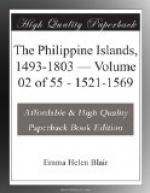great value. Velasco thinks (May 28, 1560) that
the Philippines are on the Portuguese side of the
Demarcation Line, but he will follow the royal commands
as far as he safely can. He has already begun
preparations for the enterprise, the purpose of which
he is keeping secret as far as possible. By the
same mail, Urdaneta writes to the king, acceding to
the latter’s request that he accompany the proposed
expedition. He emphasizes the ownership of “the
Filipina Island” (meaning Mindanao) by the Portuguese,
and thinks that Spanish ships should not be despatched
thither without the king’s “showing some
legitimate or pious reason therefor.” Velasco
makes report (February 9, 1561) of progress in the
enterprise; the ships have been nearly built and provisioned,
and Legazpi has been appointed its general. Urdaneta
advises (also in 1561) that Acapulco be selected for
their embarcation, as being more convenient and healthful
than Navidad. He makes various other suggestions
for the outfit of the expedition, which show his excellent
judgment and practical good sense; and asks that various
needed articles be sent from Spain. He desires
that the fleet depart as early as October, 1562.
Legazpi in a letter to the king (May 26, 1563) accepts
the responsibility placed upon him, and asks for certain
favors. Velasco explains (February 25 and June
15, 1564) the delays in the fleet’s departure;
he hopes that it will be ready to sail by the following
September, and describes its condition and equipment.
Velasco’s death (July 31) makes it necessary
for the royal Audiencia of Mexico to assume
the charge of this enterprise. Their instructions
to Legazpi (September 1, 1564) are given in considerable
detail. Especial stress is laid on the necessity
of discovering a return route from the Philippines;
and Urdaneta is ordered to return with the ships sent
back to New Spain for this purpose. By a letter
dated September 12, the members of the Audiencia
inform the king of the instructions they have given
to Legazpi, and their orders that he should direct
his course straight to the Philippines, which they
regard as belonging to Spain rather than Portugal.
In this same year, Juan de la Carrion, recently appointed
admiral of the fleet, writes to the king, dissenting
(as does the Audiencia) from Urdaneta’s
project for first exploring New Guinea, and urging
that the expedition ought to sail directly to the
Philippines. He says that he has been, however,
overruled by Urdaneta. Legazpi announces to the
king (November 18) his approaching departure from
the port of Navidad; and Urdaneta writes a letter of
similar tenor two days later. On that date (November
20) they leave port; and on the twenty-fifth Legazpi
alters their course so as to turn it from the southwest
directly toward the Philippines. This displeases
the Augustinian friars on board; but they consent to
go with the fleet. After various difficulties
and mistakes in reckoning, they reach the Ladrones




